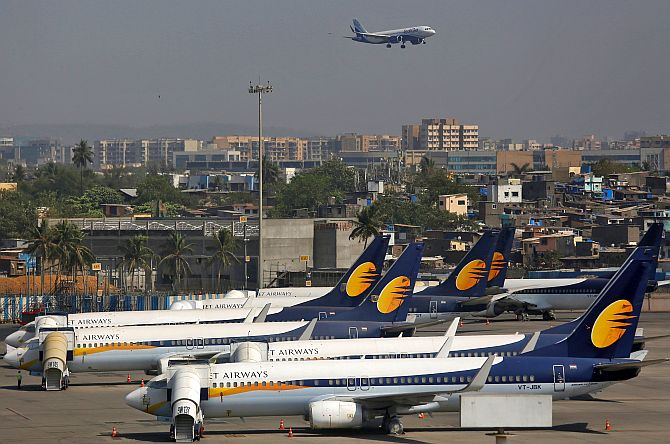 | « Back to article | Print this article |
Banks want government to retain 40 per cent of Jet slots at all airports to ensure a new owner can kick-start operations soon after taking over.
Arindam Majumder reports.

The lenders consortium, led by State Bank of India, has sought protection of prime airport slots of Jet Airways so that the value of the suspended airline does not erode further.
In a communication to the ministry of civil aviation, the lenders have made a case for protecting the Jet slots.
"Adequate number of slots at metro airports will be protected by the government. These will only be given temporarily," said a person aware of the development.
"The investors and prospective buyers of Jet Airways are aware of this and they will do their due diligence on what they can get and what they cannot," he added.
Another source said the lenders had asked the government to retain 40 per cent of Jet Airways's slots at all airports to ensure a new owner can kick-start operations soon after taking over.
"The new owner can have concerns about restarting operations if enough slots are not available," he said.
As many as 106 pairs of slots at Mumbai airport and 79 at Delhi airport are primary resources of Jet Airways, and bankers believe these will attract bidders.
Airport slots in India are allocated by a slot coordination committee of airport operators, according to the worldwide slot guidelines drawn up by the International Air Transport Association.
According to these norms, an airline can keep a given slot from the previous season as long as it has used the slot 80 per cent of the time.
Also, 50 per cent of slots freed up under this 'use it or lose it' policy are provided to new airlines and the rest to legacy carriers.
The SBI-led consortium had called for expressions of interest to buy a controlling stake (51% to 75%).
Following that, Abu-Dhabi based Etihad Airways, which currently owns a 24% stake in the airline, private equity fund TPG Capital, Indigo Partners, and India's government-owned sovereign fund National Investment and Infrastructure Fund have been shortlisted to bid for the airline.
According to an executive of a bank with exposure to Jet Airways, the lenders expect to take at least a 50% haircut on the debt.
"In such cases, normally banks settle for a 50% haircut. The exact picture would be clear after binding bids come," he said.
Jet Airways has a debt of Rs 8,500 crore (Rs 85 billion).
While the lenders are working to keep Jet attractive for prospective bidders, executives of private airports said it would be commercially unattractive for them to hold on to slots.
It could also result in a further rise in air fares.
"Construction work taking place at major airports (Delhi, Mumbai and Bengaluru) anyway is impacting the infrastructure. At this point, it would not be prudent to hold slots," an executive of a private airport said.
Another executive pointed out that even after releasing slots, availability of parking bays may not be adequate to add extra capacity.
"Jet Airways planes are taking space across many airports. We often have to park our planes in Nagpur at night and do a ferry flight in the morning to Mumbai, causing a huge loss," he said.
Civil Aviation Secretary Pradeep Singh Kharola, however, said Jet Airways would have the first right to slots once it revives.
"Airlines are getting 30 new planes by July. Slots will be allocated for a period of three months. Airlines getting extra capacity will get preference in slot allocation," he added.
After instructions from the government, some airports have given slots to other airlines to fill the gap after grounding of flights by Jet.